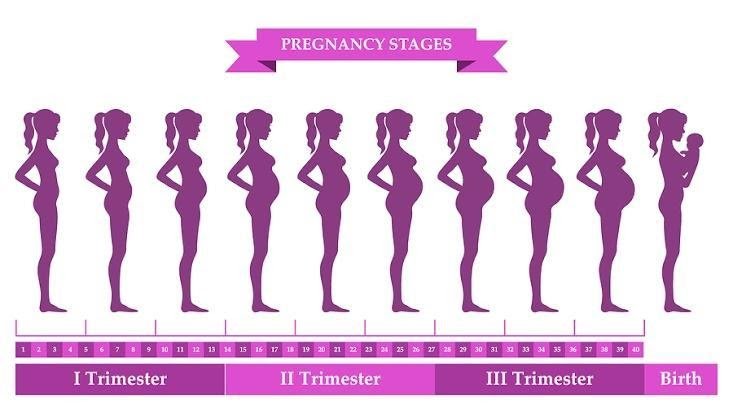
A lot of changes occur in a woman’s body during pregnancy. Some of these expected changes such as protrusion of the stomach, weight gain, breast enlargement, and swelling of the legs are visible. Other changes such as; expansion of the uterus, hormonal changes, and backaches are not visible. Although some unexpected changes could come as a surprise to you, it is left for your healthcare provider to help you adjust to it and handle it better.
The female body’s way of adapting to nurture a new life in it is nothing short of a miracle. According to bosterbio.com, it is simply amazing how these changes can happen over and over again to the same woman during every pregnancy she goes through. Here is a detailed guide on the changes your body undergoes during pregnancy.
Table of Contents
HORMONAL CHANGES

Certain hormones are unique to pregnancy. That is, they are only found in increased quantities during pregnancy. During pregnancy, you as a woman will experience a dramatic increase in progesterone and estrogen. They also experience changes and fluctuations in other hormones. These hormonal changes sometimes cause them to have mood swings. These hormonal changes can also cause the following to happen to your body;
- Changes the physical impact exercise and other physical activities have on your body.
- Causes your body to have a kind of glow unique to pregnancy.
- Aids fetus development.
Progesterone and Estrogen changes
These two hormones are the major hormones associated with pregnancy and the changes that come with it. Throughout a woman’s lifetime, estrogen is produced more when she is pregnant than when she is not. The increase in production of estrogen helps;
- The transfer of nutrients through the placenta in the uterus.
- The formation of blood vessels in the fetus.
- Supporting the development and maturation of the baby.
- The milk ducts develop therefore enlarging the breasts.
Throughout the first and second trimester, estrogen levels are seen to increase and get to their peak in the third trimester. The nausea you feel during the first trimester is a result of the rapid increase of estrogen levels.
On the other hand, progesterone levels also skyrocket during pregnancy. This increase in progesterone levels is responsible for the following;
- Increase in size of the uterus (from its pear size to a size big enough to accommodate a baby)
- Loosening of the ligaments and joints
TASTE AND SMELL CHANGES
Changes occur with the sense of taste and smell during pregnancy. There is a decrease in the ability to taste and smell and so they may ask for saltier or sweeter food than when they weren’t pregnant. That rotten smell might not smell so rotten to them and so they can sit in such a bad scenting place for a long while without noticing how terrible the place smells. This decrease in the ability to taste and smell occurs mostly in the first trimester.
BREAST AND CERVICAL CHANGES

During pregnancy, hormonal changes occur and this causes so many physiological changes in a woman’s body. These changes help to prepare the woman for the duration of the pregnancy, childbirth and nurturing of the baby. Here are some physiological changes.
Breast Changes
The breast of a pregnant woman undergoes so many changes to prepare for the newborn’s suckling. The areola gets darker and protrudes more than before. As the breasts grow, the pregnant woman notices that it gets tender and sensitive. If the breasts enlarge rapidly, you might notice stretch marks on them. Some women, start noticing a yellowish liquid dropping from their breasts in their second trimester. This yellowish liquid is called colostrum.
Cervical Changes
Pregnancy causes certain physical changes in the cervix which is the entrance of the uterus. In a lot of women, the cervical tissues thicken causing them to be firm. Few weeks to delivery, the cervix softens and dilates from the pressure of the forthcoming baby. In the first trimester, the cervix produces thick mucus which closes off the uterus. This mucus is expelled during late pregnancy or delivery and is called a bloody show.
WEIGHT GAIN AND FLUID RETENTION
The body gains weight not just because of the extra food you consume during the pregnancy period but also because of the extra load coming from the baby’s weight. This extra weight and gravity cause blood circulation to become slower in certain areas of the body especially the lower limbs, therefore, causing retention of fluids in these areas of the body.
IN CONCLUSION
These changes are only natural and shouldn’t scare you as your body will gradually readjust after pregnancy.
Thanks to advanced technology, you don’t have to draw blood to know if you are pregnant. You can use pregnancy kits today. Custom-made antibodies on pregnancy test strips can detect if your urine possesses the pregnancy hormone called HCG. All you need is a pregnancy test kit and you can find out if the changes you are noticing are actually due to pregnancy.
Visit the rest of the blog for more informational material!

